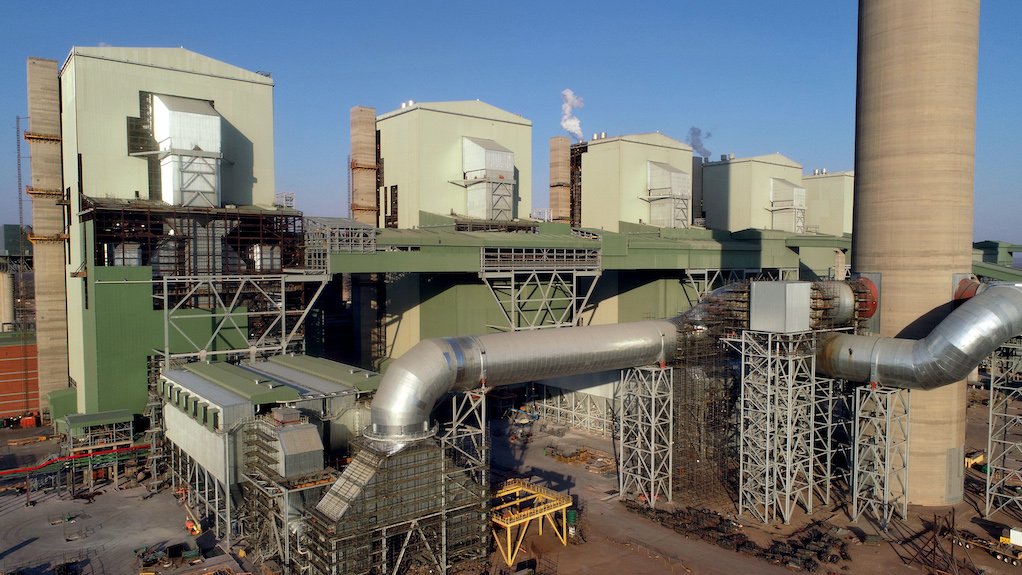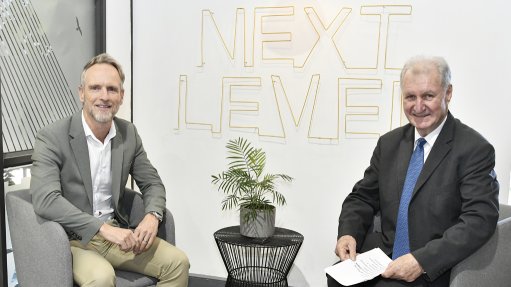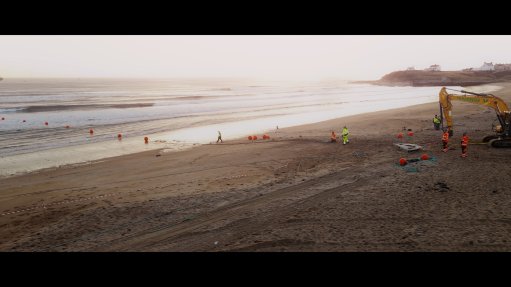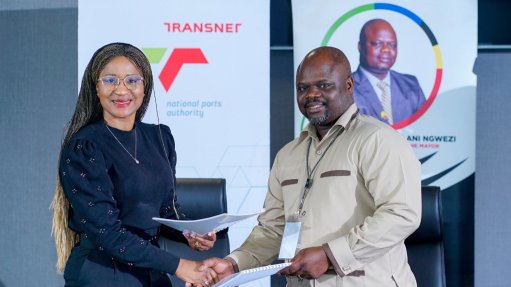Medupi power station project, South Africa – update


Name of the Project
Medupi power station project.
Location
An 883 ha site in Lephalale, Limpopo, in South Africa.
Project Owner/s
State-owned power utility Eskom.
Project Description
Medupi will be the fourth-biggest coal-fired power plant and the biggest dry-cooled power station in the world. The power station will comprise six units with an installed capacity of 4 764 MW.
The planned operational life of the station is 50 years.
The power station will use high-tech supercritical boilers, which will operate at higher temperatures and pressures, compared with those of older boilers, thereby providing greater efficiency. Supercritical technology will result in more efficient use of natural resources, such as water and coal, and will have an improved environmental performance and footprint.
It is the first baseload coal-fired power station to be built in South Africa in more than 20 years and its delivery on schedule is viewed as critical.
The project is somewhat unique because Medupi is being built in reverse order – traditionally Eskom has always started building Unit 1 and ended with Unit 6. This new approach is the result of the rock agglomeration on the southern side of the site, which was excavated and reused for engineering fill on the northern side.
The project forms part of the utility’s integrated strategic electricity plan and is designed to be wet flue-gas desulphurisation (WFGD) ready.
Potential Job Creation
At the peak of its construction, the project employed more than 18 000 people on building activities and another 2 000 supporting employees on site.
Further, more than 4 600 artisans, technicians, engineers and managers have been formally trained by Eskom’s contractors.
Capital Expenditure
The capital cost of the project is R122-billion so far, and Eskom expects to spend about R135-billion on completion of balance of plant (BoP).
Planned Start/End Date
All six units’ construction and commissioning activities were completed by July 2021, after more than a decade under construction. The project started construction in 2007.
The first unit, Unit 6, was synchronised to the grid on March 2, 2015. It attained full power (796 MW) on May 26, 2015, and attained commercial operation on August 23, 2015.
Unit 5 was first synchronised to the national grid on September 8, 2016. It reached full power (796 MW) on December 17, 2016, and attained commercial operation on April 3, 2017.
Unit 4 was first synchronised to the national grid on May 31, 2017. It reached full power (796 MW) on June 19, 2017, and attained commercial operation on November 28, 2017.
Unit 3 was first synchronised to the national grid on April 8, 2018. It reached full power (796 MW) on May 16, 2018, and attained commercial operation on June 28, 2019.
Unit 2 was synchronised to the national grid on October 7, 2018. It reached commercial operation status on November 12, 2019.
Unit 1 was synchronised to the grid on August 27, 2019. It reached commercial operation on July 31, 2021.
Latest Developments
Eskom’s actions to rectify major boiler defects at its newly built Medupi and Kusile power stations are improving the plants’ energy availability factor (EAF), in some cases almost doubling it, compared with the EAF when the first boiler’s fires were lit.
The major boiler defects pertain mainly to load losses, as a result of issues with the boiler’s pulse jet fabric filter (PJFF) plant, gas air heaters and mills.
To date, 80% of work to rectify the major boiler defects has been implemented. “The type of defects we have are those things that we could pick up only after you have run the plant for a long . . . [time]. They are mostly wear- [and] life-type [defects],”
Eskom new build defects senior engineering work leader Johannes van Tonder has said.
Eskom expects to complete the rectification work on major boiler defects in 2023.
The power utility started its major boiler defects rectification work by rolling out solutions, and testing their performance at Medupi’s Unit 3. Those solutions that proved effective were then rolled out at Medupi’s other units and at Kusile.
The defect rectification scope of work covers many components around the milling plants at Medupi and Kusile.
Work on fixing mills is typically undertaken during planned outages, when a plant is refurbished or serviced, during which time the new and modified parts are installed in place of the defect items.
Undertaking these procedures during scheduled maintenance enables Eskom to rely on its spare mills, thereby not affecting boiler uptime.
Medupi’s mills were rectified, starting in 2020. To date, “the first good effect on the life of the mills at Medupi” has been observed, Van Tonder has said.
In addressing the defects and implementing solutions – which were developed and agreed to by Eskom and the boiler manufacturer Mitsubishi Hitachi Industries (MHI) – Eskom has managed to increase Medupi’s EAF from 46% in May 2020 to 73% at the end of May this year.
However, Unit 4 of Medupi has been out of commission following an August 2021 explosion, impacting on the plant’s overall EAF. As such, excluding Unit 4, Medupi’s EAF was 82% at the end of April – almost doubling the plant’s overall EAF of the units currently in operation.
Eskom projects GM Zandi Shange has said that Eskom has been working with MHI through a mutual agreement to ensure that the defects identified are known by both parties, and that solutions thereto are agreed to by both parties.
Key Contracts, Suppliers and Consultants
Principal Contracts:
Parsons Brinckerhoff (execution partner); Roshcon (enabling civils); Rula Bulk Materials Handling (coal overland conveyor and ash dump conveyor); Mitsubishi Hitachi Power Systems Africa, or now MHI Power (boiler); Alstom S&E Africa (turbine); LP Services consortium (low-pressure services); Alula Water (water treatment plant); Karrena-Concor joint venture, or JV (chimneys and silos); MPS JV (main civils); Actom (electrical power installation and medium-voltage switchgear); General Electric (low-voltage switchgear system); Siemens (auxiliary transformers and generator transformers); Standby Systems (uninterruptible power supply); Alstom C&I (control and instrumentation); Honeywell Automation & Control Solutions South Africa (fire detection and access control); T-Systems (information technology (IT) and IT infrastructure); Siemens ACI Open Consortium (laboratory and analysers); Civcon/G4 JV (miscellaneous infrastructure and reservoirs); Basil Read (buildings, ash dump infrastructure, clarifiers and coal stockyard extension); NCI (diesel generators); thyssenkrupp Materials Handling (coal stockyard equipment); Clyde Bergemann Africa (dust handling and conditioning systems); ELB Engineering Services (terrace coal and ash); Aveng Grinaker-LTA (buildings phases 1 and 3); Nugen Technologies (nitrogen); Stefanutti Stocks/Mathomamayo JV (raw-water pumpstation and substation); WBHO (Excess Coal Stock Yard); Eskom Rotek Industries (dust handling plant – completing scope); and Exxaro (coal supply).
Contact Details for Project Information
Eskom media desk, email mediadesk@eskom.co.za.
Article Enquiry
Email Article
Save Article
To advertise email advertising@creamermedia.co.za or click here
Comments
Announcements
What's On
Subscribe to improve your user experience...
Option 1 (equivalent of R125 a month):
Receive a weekly copy of Creamer Media's Engineering News & Mining Weekly magazine
(print copy for those in South Africa and e-magazine for those outside of South Africa)
Receive daily email newsletters
Access to full search results
Access archive of magazine back copies
Access to Projects in Progress
Access to ONE Research Report of your choice in PDF format
Option 2 (equivalent of R375 a month):
All benefits from Option 1
PLUS
Access to Creamer Media's Research Channel Africa for ALL Research Reports, in PDF format, on various industrial and mining sectors
including Electricity; Water; Energy Transition; Hydrogen; Roads, Rail and Ports; Coal; Gold; Platinum; Battery Metals; etc.
Already a subscriber?
Forgotten your password?
Receive weekly copy of Creamer Media's Engineering News & Mining Weekly magazine (print copy for those in South Africa and e-magazine for those outside of South Africa)
➕
Recieve daily email newsletters
➕
Access to full search results
➕
Access archive of magazine back copies
➕
Access to Projects in Progress
➕
Access to ONE Research Report of your choice in PDF format
RESEARCH CHANNEL AFRICA
R4500 (equivalent of R375 a month)
SUBSCRIBEAll benefits from Option 1
➕
Access to Creamer Media's Research Channel Africa for ALL Research Reports on various industrial and mining sectors, in PDF format, including on:
Electricity
➕
Water
➕
Energy Transition
➕
Hydrogen
➕
Roads, Rail and Ports
➕
Coal
➕
Gold
➕
Platinum
➕
Battery Metals
➕
etc.
Receive all benefits from Option 1 or Option 2 delivered to numerous people at your company
➕
Multiple User names and Passwords for simultaneous log-ins
➕
Intranet integration access to all in your organisation



















